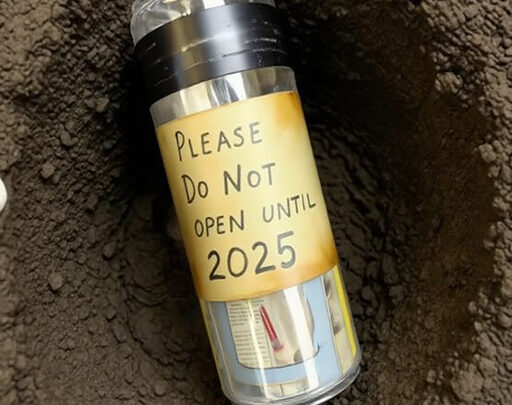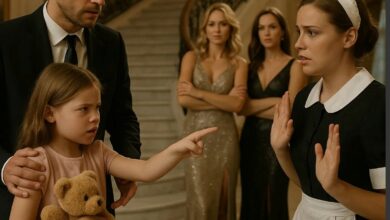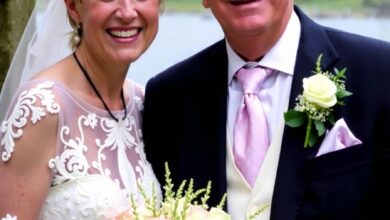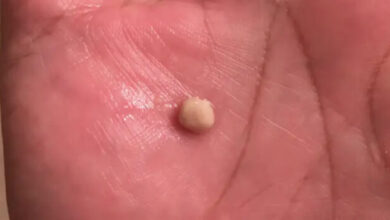Story
I Went Back to My Hometown to Dig Up a Childhood Time Capsule — but the Whispers About My Best Friend Made Me Hesitate

I drove into my hometown with a heavy heart and a trunk full of cardboard boxes. I told myself I was here to help my mother downsize and move closer to my sister, but I knew the truth. I’d come for a promise I’d sealed beneath weathered wood and childhood laughter thirty years ago.
When I turned onto the old street, my chest tightened. The houses still leaned a little, as if time had nudged them forward. The oak trees still reached across the road like they wanted to hold each other’s branches. The same cracked sidewalk ran past the house where I learned to ride a bike, fell off, and cried into the warm summer air while someone I loved very much stood beside me and promised I’d be okay.
That someone was Oliver Hayes. My best friend. My partner in scraped knees and foolish dreams.
And thirty years ago this week, under our treehouse, we buried a time capsule. Just two kids who believed life would remember us kindly.
A quick shove of the car door, a shaky breath, and there she was, my mother standing on the porch with her familiar impatience and a mug of tea she’d probably reheated three times already.
“Lena! Took you long enough,” she called out, but her eyes sparkled. My mother never could hide her excitement.
I forced a laugh and grabbed a box from the passenger seat. “Traffic,” I lied. There was no traffic, just hesitation.
She waved the excuse away. “I don’t care. You’re here. Come hug me before I fall off this porch from dramatic anticipation.”
I walked up the steps, and the smell hit me instantly: lemon polish mixed with lavender sachets she tucked into drawers. Childhood, domestic, and persistent.
“Are you sure about the retirement community?” I asked as she pulled me into her arms.
My mother huffed, releasing me. “I’m not retiring; I’m relocating to a place with heated pools, weekly dance nights, and most importantly, men who don’t remember I turned down their proposals in 1983.”
Her grin was wicked.
“Mom,” I groaned, laughing despite myself.
“What? A woman deserves options.”
We moved inside. Piles of books, knick-knacks, framed photos, and donated-to-charity boxes filled the living room. I suddenly felt ten again, watching her reorganize shelves while I sat on the rug reading picture books.
“Tea?” she asked. Before I could answer, she was already shuffling to the kitchen. “Sit, sit. You look tired.”
I did. Work had worn me down, life too. When I glanced out the back window, I nearly forgot to breathe.
The treehouse.
It was still there, though nature had gnawed at every corner. The boards sagged like an old smile, and the rope ladder hung in pieces. Moss and time had claimed it, but it still guarded the yard like a loyal ghost from my better days.
I felt a small spark of nervousness, hope, and uncertainty.
The time capsule was there. Waiting.
And so was the question I’d carried like a pebble in my shoe for three decades:
Would Oliver show up?
We spent the afternoon sorting. Mom sat on her bed, directing me like a general of nostalgic chaos.
“Don’t throw out that shoebox, there’s history in there!”
“No, not that sweater. I wore it the night your father tried to impress me by dancing and nearly sprained his spine.”
“That photo album stays. It’s my insurance policy for future family reunions. Embarrassment is a powerful motivator.”
Her chatter filled the house the way it always had a soundtrack of comfort. But my mind drifted back, again and again, to summers spent with Oliver.
Climbing trees. Racing bikes. Whispering wishes into jars of fireflies. Planning futures we didn’t yet understand.
And that final summer before he moved away.
He left so suddenly, one day he was here, the next his family car was gone, loaded with boxes. I remembered him promising he’d write, visit, call. And then… almost nothing. A postcard here, a holiday card there. Then silence. I couldn’t say who stopped trying first. Maybe neither of us meant to; life simply got louder.
But I remembered our time capsule. The day we buried it, he’d worn a shoelace necklace holding a little tin charm in the shape of a door. It had a tiny keyhole. When I asked what it meant, he’d said:
vid
“It’s my reminder to find the right door someday. For my future. And when we open this capsule, I’ll know if I found it.”
I remember laughing and asking, “What if you don’t?”
He smiled a smile that already carried sadness. “Then I’ll start looking again.”
He placed the charm in the box, and we buried it beneath the treehouse floorboards. We pressed our palms together like we were swearing an oath.
“Thirty years,” he said. “No matter what.”
I whispered it back: “No matter what.”
That evening, after Mom went to bed, I slipped on an old jacket and stepped into the cool twilight. Fireflies blinked in the backyard like tiny heartbeat reminders.
The treehouse looked smaller now, shrunken by memory. Still sacred, though. Still holding secrets.
I brushed away loose leaves and dirt from the base until I found the slab of wood we’d marked with our initials. The earth was softer than I expected. Time does most of the digging for you.
My fingers trembled as I pried up the small metal tin, rust-kissed and thin with age.
I sat cross-legged in the grass, ignoring the dampness soaking through my jeans, and opened it.
Inside were relics of childhood:
Two worn rubber friendship bracelets
A Polaroid of us holding up muddy sneakers proudly
A friendship letter in childish handwriting
A folded paper fortune teller
I smiled, laughing under my breath as I unfolded the picture. There we were, freckles, grass-stained knees, wild smiles. We looked immortal, the way children do before they learn otherwise.
And then I saw the small tin charm. The tiny door. I lifted it carefully, feeling a lump rise in my throat.
He’d left it. The symbol of his future. His promise.
What had happened to him? Had he found his door at all? Or had life locked him out?
“Hey.”
The voice behind me cut through my reverie. I startled, almost dropping the charm.
I turned.
A man stood by the fence, hands tucked into worn jean pockets. The porch light from next door cast a glow, and then I knew.
Oliver.
But not the boy I remembered. Oh, his eyes were the same thoughtful, brown flecked with gold, but the rest of him had shifted with time. His shoulders were broader, his hair flecked with gray, his smile softer and tired at the edges.
“You came,” I whispered, voice thin.
He gave a small shrug. “Made a promise.”
Some part of me exhaled, a breath I’d been holding for decades.
“I didn’t know if you’d remember,” I said.
“I remembered everything,” he replied quietly. His gaze drifted to the treehouse. “That place kept me alive, you know.”
I frowned. “Oliver…”
He sat beside me on the grass, leaving a respectful inch between us. “I heard you’re here helping your mom.”
I nodded. “She’s moving. Big changes.”
He chuckled softly, like he understood too well. “Seems like everyone’s life kept moving.”
I swallowed. “Yours too, I hope?”
He looked down at his hands. “Not in the ways I thought it would.”
Silence unfolded. Not awkward, fragile. Like if we breathed wrong, it would shatter.
I held up the tiny metal charm. “You left your door.”
He stared at it. For a moment, his face unguarded, longing, regret, nostalgia, all tangled together.
“I thought if I kept it in there,” he said, “I’d come back knowing the answer.”
“And do you?”
He shook his head, slow and heavy. “No. I don’t.”
The honesty stung. For both of us.
“What happened, Oliver?”
He blinked up at the faded stars. “Life. I chased things I didn’t really want. Tried too hard to prove I’d become someone. And somewhere along the way, I lost track of who I thought I’d be.”
He glanced at me. “And you?”
I laughed softly. “I think I became who I said I would on the outside. But inside? I don’t know if I ever figured out how to feel settled.”
He nodded like he understood more than I expected.
We sat in the hush of our shared past. Fireflies floated around us like drifting memories.
“Do you remember what we promised each other?” he asked suddenly.
“All of it,” I said. “Every ridiculous line.”
His smile returned, faint but real. “We promised we’d see who we became. That we’d decide if our childhood selves would be proud.”
I looked at the capsule in my lap. “What do you think they would say?”
He breathed out slowly. “I think they’d be confused.” Then, softer: “But maybe they’d still be hopeful.”
I nodded, feeling a warmth rise in my chest, not joy exactly, but connection. Recognition.
“Do you ever regret leaving?” I asked before I could stop myself.
He hesitated. “Sometimes. But staying wouldn’t have saved me. I had to go. I just… didn’t know how to come back.”
He looked at me. “And I wasn’t sure you’d want me to.”
I blinked, startled. “Of course I would.”
He laughed, but it cracked. “You say that now.”
“I would’ve said it then, too.”
He studied me. Really studied me. “You waited.”
It wasn’t a question. It wasn’t even about the time capsule.
“I didn’t realize I was waiting,” I answered honestly. “But I guess part of me was.”
Wind rustled through the trees. A dog barked somewhere. The world felt balanced, suspended.
Finally, I placed the charm back in the tin and closed it gently.
“I think,” I said softly, “maybe this isn’t about finding the door. Maybe it’s about opening one whenever it appears. Even if it’s late.”
Oliver breathed a quiet laugh. “I’d like that.”
He stood then, brushing off his jeans. “I should go. I just wanted to see if the promise mattered.”
“It did,” I said. “It still does.”
He hesitated, then offered his hand. A handshake would have felt wrong. Instead, I pulled him into a hug. It felt like hugging summer and childhood and an echo of who I used to be.
“Take care of yourself, Lena,” he murmured.
“You too, Oliver.”
He stepped back, meeting my eyes one last time. “Maybe this time, we won’t lose touch.”
“Maybe we won’t.”
He nodded, turned, and walked into the quiet street. His footsteps faded among cicadas and starlight.
I sat alone for a long time, holding the time capsule against my chest.
We had not fallen apart because of anger or betrayal; we had drifted, the way leaves drift downstream, even when they start attached to the same branch.
And now, thirty years later, we had drifted back just long enough to understand something simple:
Growing up doesn’t always mean growing into everything you imagined. Sometimes it means forgiving yourself for changing.
I placed the tin back into the earth, a grave not for childhood dreams, but for expectation. A promise fulfilled doesn’t need to be held anymore.
When I returned inside, the house felt less haunted by memory and more alive with it. I poured myself a cup of tea gone cold and smiled.
Sometimes you go home to pack boxes.
Sometimes you go home to keep a promise.
And sometimes — if you are lucky — you go home to find a piece of yourself you didn’t realize you left behind.
And tonight, I had found just enough.




